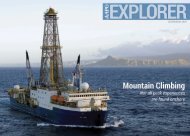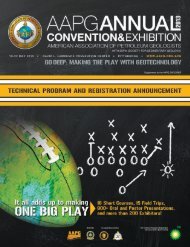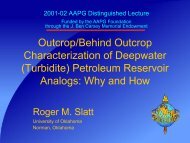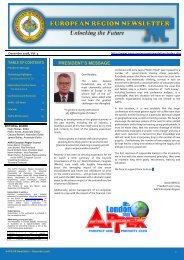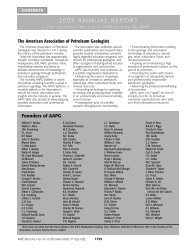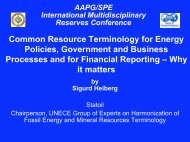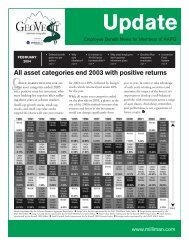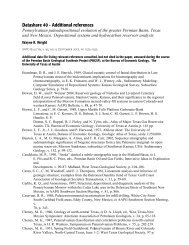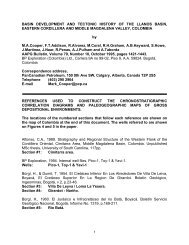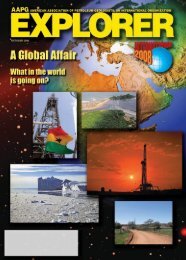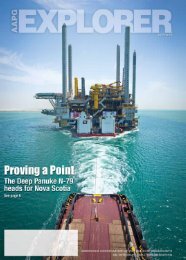Download - American Association of Petroleum Geologists
Download - American Association of Petroleum Geologists
Download - American Association of Petroleum Geologists
You also want an ePaper? Increase the reach of your titles
YUMPU automatically turns print PDFs into web optimized ePapers that Google loves.
AAPG<br />
EXPLORER<br />
Marcellus: Blessing? Curse?<br />
Author Knows Both<br />
Sides <strong>of</strong> a Controversy<br />
By DAVID BROWN, EXPLORER Correspondent<br />
In answer to the question “Is the extensive<br />
Marcellus shale development a blessing<br />
or a curse for landowners?” author<br />
Seamus McGraw has been known to<br />
answer:<br />
“Both.”<br />
He bases that answer on experience.<br />
His widowed mother signed a lease on her<br />
Pennsylvania farm with Chesapeake Energy<br />
Corp. at the peak <strong>of</strong> the Marcellus land<br />
frenzy. That brought her a handsome lease<br />
bonus on her hundred acres.<br />
A blessing.<br />
It also brought a<br />
disorienting incursion<br />
<strong>of</strong> trucks and heavy<br />
equipment, the<br />
grinding roar <strong>of</strong><br />
drilling rigs, worries<br />
about water quality,<br />
the discharge <strong>of</strong><br />
chemical-laced fluid<br />
into rivers and streams,<br />
a disruption <strong>of</strong> lifestyle<br />
and landscape, a crippling strain on<br />
community.<br />
The curse.<br />
McGRAW<br />
McGraw related his family’s experiences<br />
during the advent <strong>of</strong> the Marcellus shale<br />
play in “The End <strong>of</strong> Country,” published in<br />
2011. The book provides a window on the<br />
many ways the developing play affected<br />
his mother and her neighbors in their rural<br />
neighborhood.<br />
He will discuss that period and his<br />
current perspective on oil and gas<br />
development on Tuesday, May 22, as<br />
speaker for the Energy Minerals Division<br />
luncheon at the AAPG Annual Convention<br />
and Exhibition in Pittsburgh.<br />
About “The End <strong>of</strong> Country,” McGraw<br />
said, “I think it’s about the challenge that<br />
comes from what happens below the<br />
surface being mirrored in communities<br />
above the surface.”<br />
“The word ‘fracking’ has come to be a<br />
very powerful word in this conversation,”<br />
he added. “We push the word and pull<br />
it – we Silly Putty it to cover everything that<br />
happens in the process.”<br />
In McGraw’s view, hydr<strong>of</strong>racturing<br />
equates to pumping fluid down a hole<br />
under enormous pressure to create fissures<br />
and to exploit existing fractures. He thinks<br />
communities go through something similar<br />
when an unconventional play develops.<br />
“They have been exploiting existing<br />
fractures within these communities,” he said,<br />
“with enormous consequences.”<br />
Regrets? He’s Had a Few<br />
McGraw described himself as still deeply<br />
conflicted about his family’s actions in<br />
leasing their farm for drilling. He recounted a<br />
Award-winning author Seamus<br />
McGraw will be the speaker for<br />
this year’s Energy Minerals Division<br />
Luncheon, set at 11:30 a.m. Wednesday,<br />
May 22, at the AAPG Annual Convention<br />
and Exhibition in Pittsburgh.<br />
McGraw’s talk will be titled<br />
“Comfortable in Our Own Ignorance.”<br />
The session will focus on how<br />
extreme voices on both sides <strong>of</strong> the<br />
radio interview during which he was asked,<br />
“Do you regret the decision you made?”<br />
“I said, ‘I’m a 54-year-old, chain-smoking,<br />
recovering alcoholic. I can probably count<br />
the things I don’t regret on the fingers <strong>of</strong> one<br />
hand,’” he recalled.<br />
The better question would be “Would<br />
you do it again?” McGraw observed.<br />
“And the answer is, ‘Yes, I would,’” he<br />
said.<br />
In a way, that answer reflects McGraw’s<br />
environmental beliefs.<br />
“I’m a 54-yearold,<br />
chain-smoking,<br />
recovering alcoholic.<br />
I can probably count<br />
the things I don’t<br />
regret on the fingers<br />
<strong>of</strong> one hand.”<br />
“We’ve reduced our coal consumption<br />
partly by development <strong>of</strong> renewables,”<br />
McGraw said. “We’ve reduced our carbon<br />
output by about the total carbon output <strong>of</strong><br />
England. We’ve taken some real steps. Not<br />
enough, but real steps.”<br />
Yet the United States’ recent ability<br />
to curb pollution and greenhouse gas<br />
emissions largely comes from something<br />
else.<br />
“If you listen to the EIA (the U.S. Energy<br />
Information Administration), the biggest<br />
reason is natural gas,” he said.<br />
Unconventional resource development<br />
has produced not only more abundant but<br />
also much cheaper natural gas supplies,<br />
shifting the balance away from morepolluting,<br />
coal-fired power plants.<br />
It also has lessened America’s<br />
dependence on imported oil and gas. And<br />
McGraw said that’s important when he<br />
thinks about his young son, and his own<br />
days as a journalist writing about the war in<br />
Iraq.<br />
“I don’t want him standing on the same<br />
sand I was standing on with a gun in his<br />
hand, trying to protect someone else’s water<br />
or someone else’s oil,” he said.<br />
McGraw might have seen the worst <strong>of</strong><br />
the industry’s early push into shale gas.<br />
Numerous frac fluid spills occurred in<br />
northeast Pennsylvania, many caused when<br />
drillers lost control <strong>of</strong> flowback.<br />
His family’s farm is just five miles from<br />
Dimock, where an operator was ordered<br />
See McGraw, page 67<br />
public debate over shale gas exploration<br />
and development are effectively<br />
undermining efforts to develop the<br />
resource more safely, damaging efforts<br />
to maximize its potential environmental<br />
advantages and preventing the real<br />
economic benefits from taking hold.<br />
The perspective, he says, goes for<br />
both sides <strong>of</strong> the debate.<br />
64 MAY 2013 WWW.AAPG.ORG



